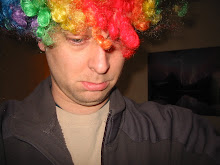If one's willing to entertain the notion of RPGs as art, it's probably the more obvious role playing aspect of the game that first seems to justify the view. The voice acting and discussion of what the game's characters say and do is the most spontaneous and dynamic aspect of the creation of the meta-space (or playing field). It’s also the most overtly collaborative, and for most people the part that's the most fun.
However - if we continue with the idea that, as I said earlier, in many ways the creation of the imaginary entertainment environment (to use McKay’s term again) is the game, then the game is still being played (that is, the art is still being created) even when the actual role playing isn’t occurring. It’s being played when the GM creates the campaign world: when he maps it, populates it, when he creates new magic items or spells that will be discovered and used in it, etc. Similarly, when players roll up a new character, they’re using the game rules to help them create a framework from which they’ll know how to interact with the shared meta-space. They may go on to invent a personal history to deepen the meta-space and further inform their actions - in short they're creating a unique brush with which they will add their own flourishing touches to the larger canvas. From this point of view, anything you do with creative intention that will impact the shared play meta-space is in essence playing the game.
RPG Campaign Tour Challenge 2026 - DAY 13
25 minutes ago







4 comments:
Sure.
--Sounds good.
I think it's worth pointing this out here, because I've seen where, for example, players have been criticized for seeming to overly enjoy the act of creating their characters, or DMs somehow going off the deep end and populating their worlds with great details that will in all likelihood not be actually utilized by players in any role playing way. In these cases, the bottom line is that even without role playing occurring, the players and DM in this example can be said to be playing (and enjoying) the game. Perhaps framing it in this manner will help people check themselves when criticizing others for "not doing it right".
In addition, looked at from this point of view, the collection of games, supplements, and any manner of resources is no different than the collecting and enjoyment of any art - there's no shame in buying a game and not playing it, and no reason to judge someone else for doing so.
I'd like to see more of an open attitude in our hobby, perhaps occasionally stepping back and examining it from the point of view of it being just another type of art can help.
Good stuff, brother!
This has me thinking about two things:
1. The the "meta-space" is where the game is actualized. Before this actualization, what exists--either on paper or in the imagination--are systems and rules, plans, character concepts (and hopes and dreams), unexplored places, undiscovered treasure, etc. All good and valid stuff. And we bring all that stuff to the gaming table, where some of it sees the light of day, and the product is then something new and completely different. It's like adding sodium (a metal) and chlorine (a nasty gas) and getting halite, an amazingly valuable substance that bears no resemblance to its constituent elements. Not that the away-from-the-game table stuff is bad or unimportant--most of us spend many enjoyable hours away from the table. But we all know the magic of a great game session. It also highlights to me that all the angst and naysaying and judging and negativity has to do with those things that by and large exist outside the gaming meta-space.
@ze bulette: It's like theologians arguing about how to parse an nonessential Greek word in an obscure ancient text and all the while forgetting that the main point of their faith is their relationship to the divine being. The bottom line in gaming is entertainment, not purity (for some reason, the religion analogy has been striking a chord with me).
Or maybe I am all wrong on that.
2. Thinking about gaming in this way is helpful to me from a GM/DM/CK/Ref perspective because it brings me back to how my players experience the game within the meta-space. This has given me food for thought that may result in a post of my own.
Or I might just write a haiku about brownies.
Great series of posts. Thanks again!
@Axe - I'm very glad you liked this series of posts, it's been something I've been wanting to formulate in words since beginning this blog.
I think you completely understand where I'm coming from based on how you've described the game actualization process in your comment above, and your religion analogy does make sense in a certain way and is understandable: once we've defined the game as art, it's a small step to approach archetypal representation within it: from there, we could easily continue the discussion in terms of anthropology, mythology, Jungian psychology, storytelling and the birth of religion, and maybe even the beginnings of ethics.
I know it can seem a bit ridiculous or at least overwhelming to abstract the game in this manner, but as I've said, doing so occasionally has its uses!
Post a Comment